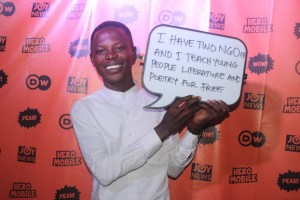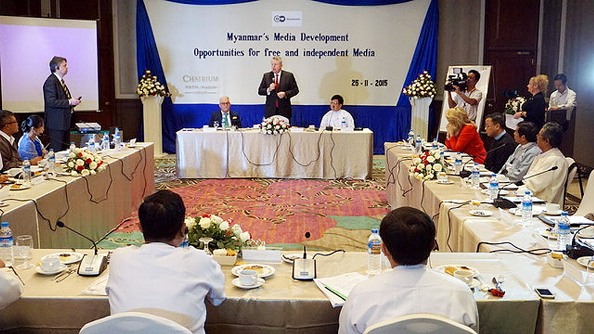Market roundup: December 2015
Mobile
Downloads for the DW app have grown immensely in recent months. The number of total downloads is currently at around 850,000 – a big leap from 250,000 in September. The app was launched in June to accompany the launch of DW’s international news channel.
Middle East
A campaign for DW Arabia is showing a lot of success in Morocco, Egypt and Iraq, the three largest media markets in the Arab world. Indicators include a video trailer on YouTube and Facebook that already has over 1 million views. The campaign highlights the credibility and transparency of DW’s programming against other broadcasters, whose reporting can fall into sensationalism. DW Arabia also explores taboos in the Arab world, which are avoided by other regional broadcasters. The “Discover the Difference” campaign will run until the end of the year.
Asia
DW has a new partner in Indonesia. Cable provider Dens TV is now carrying the complete program of DW’s English channel for audiences in Jakarta.
Building a free press from the ground up in Myanmar
With the change in government in Myanmar, a new broadcasting act is to be put in place that will allow private television broadcasting for the first time in the history of the country.
It is a critical time for Myanmar, which had been ruled by military dictatorship from 1962 to 2011, and with former military leaders continuing to maintain power in parliament since that time. After a parliamentary election on November 8, the NLD party that supports liberal democratic values won a landslide majority vote and now has the mandate to govern.
The importance of a free media in developing liberal public institutions will make itself very apparent in the near future and the level of press freedom that will actually be allowed is something to monitor. Myanmar currently ranks 144th out of 180 nations on the Reporters Without Borders Press Freedom Index. Harassment and imprisonment of journalists was widespread in Myanmar as recently as 2014.
This is why institutions like DW Akademie can make a huge difference. As Germany’s largest media development organization, it has been deeply engaged in media development in Myanmar since 2012. With the changes in the past year, DW Akademie’s activites in Myanmar have been greatly expanded. In October 2015, DW Akademie worked in cooperation with the United Nations Development Programme (UNDP) and organized a series of workshops to introduce how community broadcasting works. Myanmar also elected a press council and DW Akademie representatives attended the ceremony. Earlier in 2015, DW Akdemie organized a training program for local journalism teachers that will help support the development of local media and promote a culture of quality media at its roots.
DW has also been a consistent trusted advisor to the state broadcaster MRTV and in 2014 helped found the Myanmar Journalism Institute, the first private journalism school in Myanmar. At a recent event, organized by DW Akademie in Yangon, DW’s Director General Peter Limbourg met with media representatives to discuss the opportunities and challenges of the transition.
There has also been criticism of a 2014 News Media Law in Myanmar from the free speech watchdog Article 19, with the safeguards for media freedom being,”heavily qualified and insufficient to meet international standards.” The media situation began to look better on paper, but according to Article 19, the laws often relied on imprecise legal language that doesn’t fully guarantee freedom of expression.
Besides the trappings of governance, there is also the issue of developing a confident and effective media culture in Myanmar, so that journalists know how to do their jobs and take advantage of their potential new freedoms.
Though the transition into a free media market will be a bumpy ride for broadcasters and other media operators in Myanmar, an essential aspect of quality journalism begins from the ground up. If journalists posses skills and resources, combined with freedom to report and produce stories that have a positive effect on the social development of Myanmar, the business side of the problem could have less of an adverse impact. If the new government continues a legacy of bureaucratic and back-door control of the media, it will say a lot about where the country is heading.
New Learning by Ear series in Kenya gets close to reality
Work on Learning by Ear’s new dramatic radio series in Kenya, Crime Fighters, had already begun in early April when militants attacked Garissa University in the northern part of the country killing 147. A few weeks before the attack, DW Hausa‘s Pinado Abdu finished writing a section of the series titled The Radical Journey, which focused on what would make a young person turn to terror. Even before its first broadcast, Crime Fighters was already touching on an unfortunate reality – but the series also provides many positive lessons.
Crime Fighters is aimed primarily at young Africans and encourages them to understand their problems in a more conscious and courageous light. The stories center on young investigators who solve challenging cases that affect young Africans like terrorism, property theft, poaching and counterfeit drugs. The stories were written by a team of African authors. In total, Crime Fighters is made up of 32 ten-minute episodes that are divided in to four fictional criminal cases taking place all over Africa.
DW’s Head of Programming for Africa, Claus Stäcker, said that the crime series allowed the Learning by Ear tradition to continue highlighting current conflicts across Africa in a more “exciting and entertaining” manner. “We provoke the listeners into taking a position on issues and provide food for thought without coming across like a school teacher.”
Recording for the series was completed in May at the Kenya Institute of Curriculum Development in Nairobi. Crime Fighters is now being broadcast in English, Kiswahili, Hausa, French and Portuguese in 30 African countries.
Crime Fighters is part of the educational radio series produced by Learning by Ear, which has been a big hit in Africa. Like the successful series Crossroads Generation , Crime Fighters is broadcast by over 250 partner stations across the continent. It is also available by podcast on AfricaLink and will be heavily featured on social media.
It all started in Rwanda…
This year, DW Akademie is celebrating its 50th anniversary. It’s an institution that has grown immensely since that first training program for radio technicians in Rwanda. It has steadily expanded its work promoting press freedom, freedom of expression and media development. But the game has changed over the past five decades. Information can now reach every corner of the world, which is why media development has taken center stage in development policy. DW Akademiie is meeting these challenges with an innovative and interdisciplinary approach. They work on political frameworks in consultation with government authorities and NGOs, for example, and advise journalists and the media on developing new business models to assure their financial independence. Today, DW Akademie works in 50 countries around the world, with sustainably designed programs and clearly defined aims.
Meet Ghana’s heroes
The media does its job when people who would otherwise go unnoticed and important things that would otherwise go unseen are cast into the light. Communities all over the world are created by the sum of the good work of many individuals. As an international broadcaster, DW has taken this to heart and created the local heroes campaign to provide people around the world the chance to express themselves and share the special things they do for their communities.
The local heroes campaign recently reached new heights in Ghana, where people from across the capital Accra were literally given a stage to express themselves and celebrate their communities. Created in cooperation with local broadcaster Joy News, the Heromobile took to the streets of Accra in October, visiting the neighborhoods Madina, Nima, Teshie and Labadi. At each stop during the afternoon the Heromobile toured the neighborhood asked people to share what made them stand out or what they were doing to make a difference. A stage was built and a celebration complete with artists and musicians created a sense of empowerment among the community.
 The level of engagement people in Accra have is truly inspiring and the Heromobile campaign helped bring it out. More than 10,000 people turned out to participate and celebrate. The people who came out and shared their lives are as diverse and fascinating as their work. In Madina, Shadrach Victor Kwetso runs NGO’s and teaches young children literature and poetry free of cost. Rita Tacki Manieson teaches people how to weave and work with beads. In Nima, Adiza Alhassan sells food at a very low price and provides free food for mentally and physically disabled people in her community. Albert Stone Donkor has been coaching basketball in the community for over 25 years. In Teshie, Paulina Asorkor Amarh runs a center for widows that takes care of them and provides clothes and food. Nii Mensah Sowah runs a free school for less-privileged youth. In Labadi, Seth Mensah Quarshie Yemo is an actor who gives free acting lessons to local youth. Jospeh Adeti is an athlete that organizes soccer matches and coaches young people.
The level of engagement people in Accra have is truly inspiring and the Heromobile campaign helped bring it out. More than 10,000 people turned out to participate and celebrate. The people who came out and shared their lives are as diverse and fascinating as their work. In Madina, Shadrach Victor Kwetso runs NGO’s and teaches young children literature and poetry free of cost. Rita Tacki Manieson teaches people how to weave and work with beads. In Nima, Adiza Alhassan sells food at a very low price and provides free food for mentally and physically disabled people in her community. Albert Stone Donkor has been coaching basketball in the community for over 25 years. In Teshie, Paulina Asorkor Amarh runs a center for widows that takes care of them and provides clothes and food. Nii Mensah Sowah runs a free school for less-privileged youth. In Labadi, Seth Mensah Quarshie Yemo is an actor who gives free acting lessons to local youth. Jospeh Adeti is an athlete that organizes soccer matches and coaches young people. 
These are only a handful of the dozens of local heroes who joined the Heromobile at each stop. In the days following the events more people checked in on social media from around Ghana to ask if the Heromobile would be coming to their town and express regret that the campaign had ended before they could join. While the Heromobile is no longer running, the local heroes of Accra, and everywhere else, will always be taking action and improving their communities. Wherever DW goes next, they will be sure to have their chance to speak out.











Feedback